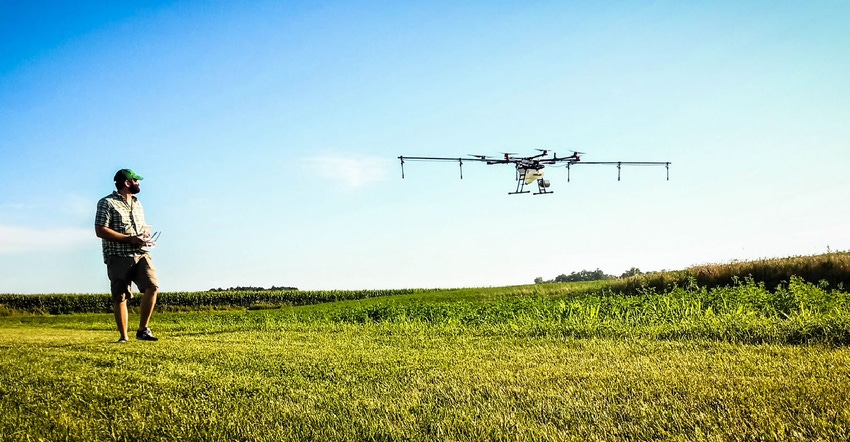February 11, 2021

In January 2020, Michael Ott participated in the American Farm Bureau Innovative Challenge contest at the American Farm Bureau Federation (AFBF) national convention. One year later, he was a presenter for the 2021 AFBF virtual annual convention in a session about how new technology can get traction. The company he founded, Rantizo, of Iowa City, Iowa, is licensed to custom-apply ag chemicals, cover crops and other things in 17 states, including Indiana.
His story gives a glimpse of how developing technologies might reach your farm in the future. It also highlights the challenges innovators who want to commercialize new technology must overcome.
Unique business model
Ott saw an opportunity to use drones to deliver pesticides and cover crop seeds. Instead of selling drones, he decided to sell the service.
Rantizo has a network of over 30 custom applicators equipped with drones. The company is currently licensed to apply products in 17 states. The business model includes developing a self-contained trailer with everything a contractor needs. If you’re a grower who needs a chemical applied or a field seeded with cover crops, Rantizo connects you with a custom applicator.
“Maybe you need to spray patches of weeds in 5% of the field, and it doesn’t make sense to drive the entire length of a field with a sprayer,” he says. “A drone can do the same thing quickly and easily.”
Other niche uses are presenting themselves, he notes, especially in specialty crops. For example, there is a specific pest of grapes that is primarily a problem along the edge of a vineyard. Spraying it with traditional methods might cost more than curing the pest is worth, but controlling it with a drone might add yield and provide a return on investment to the application.
Challenges and hurdles
The first hurdle was obtaining approval to spray from drones. State agencies which govern pesticide application were familiar with aerial applications, of course, but not with drones. The challenge requires education and sometimes flexibility. Rantizo is working with officials in Michigan so that a custom applicator can apply there.
Application is more efficient if a contractor can use a swarming concept, with perhaps three drones at once in the same field. That required helping officials at the Federal Aviation Administration understand that with drones, a pilot can fly more than one aircraft at the same time. It was a foreign concept, until now.
The other big challenge is seeking investors, Ott notes. One of the investors in Rantizo is Innova Memphis, founded in 2007 to help fill a funding gap for startup companies trying to launch in the ag sector. Dean Didato, who also participated in the recent AFBF session, says many venture capital companies prefer investing in later-stage startups with less risk. “If you have an idea for bringing a technology to market, run it by us,” he says. “This is our niche.” Learn more at: innovamemphis.com.
Pete Nelson of Ag Launch, based in Tennessee, also provided support to Rantizo. Sometimes the support is networking, and helping a new company grow and achieve publicity at the right rate. “If it gets a large amount of coverage too early, it can be counterproductive,” Nelson says.
Rantizo intends to be around for the long haul, Ott says. Check out rantizo.com.
You May Also Like




